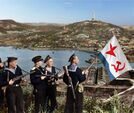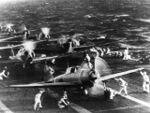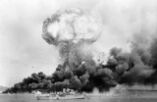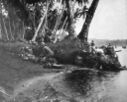Invasion of Los Angeles: Difference between revisions
No edit summary |
No edit summary |
||
| (7 intermediate revisions by 2 users not shown) | |||
| Line 17: | Line 17: | ||
|alt6=}}'''Clockwise from top left:''' {{flatlist| | |alt6=}}'''Clockwise from top left:''' {{flatlist| | ||
* Inglaterran troops raise the flag of the new [[Communist Los Angeles|communist regime]] in Los Angeles. | * Inglaterran troops raise the flag of the new [[Communist Los Angeles|communist regime]] in Los Angeles. | ||
* | *Dilanian fighter aircraft prep for takeoff. | ||
*An Angelean squad takes cover during the [[Battle of the Californias]]. | *An Angelean squad takes cover during the [[Battle of the Californias]]. | ||
*Inglaterran troops advance forward on 3 | *Inglaterran troops advance forward on 3 October. | ||
*Onhsanenean troops try to hold the line outside of [[Jensdorp]] during the [[Battle of Jensdorp]]. | *Onhsanenean troops try to hold the line outside of [[Jensdorp]] during the [[Battle of Jensdorp]]. | ||
*An explosion destroys the last fuel supply of the Angelean Navy during the [[Bombardment of the Californias]]. | *An explosion destroys the last fuel supply of the Angelean Navy during the [[Bombardment of the Californias]]. | ||
| Line 26: | Line 26: | ||
| alt = | | alt = | ||
| caption = <!-- TBD --> | | caption = <!-- TBD --> | ||
| date = 27 | | date = 27 July 1945 – 12 December 1945<br /><small>({{Age in years, months, weeks and days|month1=07|day1=27|year1=1945|month2=12|day2=12|year2=1945}})</small> | ||
| place = [[Los Angeles]] | | place = [[Los Angeles]] | ||
| coordinates = <!--Use the {{coord}} template --> | | coordinates = <!--Use the {{coord}} template --> | ||
| Line 41: | Line 41: | ||
| combatants_header = | | combatants_header = | ||
| combatant1 = '''[[Second Coalition]]'''<br>{{flagicon image|Logon V3.png}} [[Republic of Los Angeles|Los Angeles]]<br>{{flagicon image|Onhsanenea 1940s Flag.png}} [[Sultante of Onhsanenea|Onhsanenea]]<br>{{flag|The Furbish Islands}}<br>{{flagicon image|GN-1.png}} [[Greater Niagara]] | | combatant1 = '''[[Second Coalition]]'''<br>{{flagicon image|Logon V3.png}} [[Republic of Los Angeles|Los Angeles]]<br>{{flagicon image|Onhsanenea 1940s Flag.png}} [[Sultante of Onhsanenea|Onhsanenea]]<br>{{flag|The Furbish Islands}}<br>{{flagicon image|GN-1.png}} [[Greater Niagara]] | ||
| combatant2 = '''[[Yedinburg Pact]]'''<br>{{flagcountry|Komrep Inglaterra}}<br>{{flagicon image|Dilanian State Flag.png}} [[Dilanian State|Dilania]]<br>{{flagicon image|Evil Yawatha Flag.png}} [[Yawathan National Republic|Yawatha]]<br>{{flagicon image|Modern Alanna Flag.png}} [[Zurokist Alanna|Alanna]] | | combatant2 = '''[[Yedinburg Pact]]'''<br>{{flagcountry|Komrep Inglaterra}}<br>{{flagicon image|Dilanian State Flag.png}} [[Dilanian State|Dilania]]<br>{{flagicon image|Evil Yawatha Flag.png}} [[Yawathan National Republic|Yawatha]]<br>{{flagicon image|Modern Alanna Flag.png}} [[Zurokist Alanna|Alanna]] | ||
| commander1 = TBDCOMMANDERLIST <!-- For easier formatting of this feel free to just list one leader per line, remember to use <br> --> | | commander1 = TBDCOMMANDERLIST <!-- For easier formatting of this feel free to just list one leader per line, remember to use <br> --> | ||
| commander2 = TBDCOMMANDERLIST | | commander2 = TBDCOMMANDERLIST | ||
| Line 58: | Line 58: | ||
}} | }} | ||
The '''Invasion of Los Angeles''' ([[Conversilha Language|Conversilha:]] ''Invasión di Los Angeles''), also known as '''Operation Fallen Angel''' ([[Inglaterran Language|Inglaterran]]: ''Operaasje Fallen Ingel''), or simply as the '''Fall of Los Angeles''' was a joint invasion by members of the [[Yedinburg Pact]], chiefly [[Komrep Inglaterra | The '''Invasion of Los Angeles''' ([[Conversilha Language|Conversilha:]] ''Invasión di Los Angeles''), also known as '''Operation Fallen Angel''' ([[Inglaterran Language|Inglaterran]]: ''Operaasje Fallen Ingel''), or simply as the '''Fall of Los Angeles''' was a joint invasion by members of the [[Yedinburg Pact]], chiefly [[Komrep Inglaterra|Inglaterra]], [[Dilanian State|Dilania]], [[Yawathan National Republic|Yawatha]], and [[Third Alannan Empire|Alanna]]. For the [[Second Coalition|Coalition]] forces, a naval detachment from [[The Furbish Islands]] and [[Niagaran Empire]], the remainders of the [[Onhsanenean Sultante|previous regime in Onhsanenea]], and the evacuated expeditionary forces of Los Angeles attempted to defend the island. The invasion would end with the capitulation of Los Angeles, the installation of a [[Communist Los Angeles|new communist regime]], and the effective end of combat operations in Galia. | ||
War had begun in earnest in Galia on 19 March 1939, when Yawathan troops [[Invasion of Onhsanenea|entered Onhsanenea]]. Los Angeles declared war against Yawatha, Dilania, and other members of the Yedinburg Pact and deployed troops to fight in Onhsanenea. The conflict remained a stalemate until the [[Capitulation of Naossia|Naossian surrender]] in 1944, at which point Yedinburg Pact troops advanced deep into Onhsanenea and effectively occupied the entire country by the end of March 1945. At the same time, [[Capitulation of Alaoyi|Alaoyi's surrender]] came in | War had begun in earnest in Galia on 19 March 1939, when Yawathan troops [[Invasion of Onhsanenea|entered Onhsanenea]]. Los Angeles declared war against Yawatha, Dilania, and other members of the Yedinburg Pact and deployed troops to fight in Onhsanenea. The conflict remained a stalemate until the [[Capitulation of Naossia|Naossian surrender]] in 1944, at which point Yedinburg Pact troops advanced deep into Onhsanenea and effectively occupied the entire country by the end of March 1945. At the same time, [[Capitulation of Alaoyi|Alaoyi's surrender]] came in September 1945, as joint Inglaterran-Dilanian-Alannan armies captured several key cities, including the capital of [[Biyonummiri]]. With combat operations in mainland Galia halted, preparations were made to attack Los Angeles, the final Coalition member still standing. | ||
The invasion consisted of three phases. The first phase, ''Fase Blau'' (Phase Blue) began on 27 July 1945. The prime advantage of the Coalition forces lay in a large naval taskforce made up of three capital ships (the XXX), and twelve destroyers (XXX). While the combined Dilanian and Inglaterran fleets outnumbered the Furbish-Niagaran fleet, the Furbish and Niagaran ships were both more modern and crewed by better trained sailors. In addition, the [[Angelean Navy]] maintained a small but well equipped submarine fleet of 15 submarines. The risk of high casualities (some estimates had over half of the troop transports being sunk) during any amphibious landing was considered unacceptably high by Inglaterran and Dilanian planning standards (though considered tolerable by the Alannans and Yawathans). Neutralization of the Coalition naval forces was considered to be essential to any invasion of Los Angeles. | |||
On 27 July 1945, the Dilanian carrier ''[[Negisgigayesgi]]'' alongside four destroyers strayed close to the Angelean coast. A small skirmish ensued with one Dilanian destroyer, the ''[[Saliguga]]'', sunk. Unable to resist the opportunity to destroy the Dilanian carrier, the XXX and YYY pursed the ''Negisgigayesgi'' and the remaining destroyers. At this point, land-based dive bombers and other aircraft attacked the Niagaran contingent, which lacked air cover from either land-based air or the FSS Sexdick. This led to the sinking both the XXX and YYY along with six destroyers to the cost of two destroyers and roughly 12 aircraft. On 28 July, three Inglaterran carriers (the [[Harkzel (Ship)|''Harkzel'']], [[Orcakust (Ship)|''Orcakust'']], and [[Fort Anders (Ship)|''Fort Anders'']]) and two Dilanian battleships (the ''[[Tsusquiganihiisdodi]]'' and the ''[[Daganehiisdodi]]''), along with 20 destroyers, pursed the ''[[NMF Nòu Occitània]]'', forcing her to flee from her base in [[Santa Catalina, Los Angeles|Santa Catalina]] to [[Playadiestat]], leaving a gap in the Angelean naval defenses. The Yedinburg Pact naval forces then attacked the submarine base at Sacramento. The Angeleans, caught off guard, could only evacuate three submarines, leaving 12 of the 15 to sink. The submarines ''[[Sinti Sushina?]]'', ''[[Pega!]]'', and ''[[Sombra di Intenshon]]'' also fell back to Playadiestat, arriving on 29 July. Knowing that invasion was inevitable, much of the Angelean government, with the exception of [[Prime Minister of the Angelean Republic|Prime Minister]] [[Johannes Huerta]] and military high command, was evacuated aboard the ''Sinti Sushina?'' and ''Pega!'', leaving the ''Sombra di Intenshon'' in Playadiestat as a last resort. The other two subs linked up with the Furbish contingent and sailed for [[Kitchener, Tasmana|Kitchener]], [[Tasmana]] on July 30. Coalition naval power had been eliminated in a humiliating defeat at the [[Battle of the Angelean Gulf]]. | |||
''Fase Grien'' (Phase Green) began on 21 September 1945 and was the second phase of the operation. Close to 250,000 troops, primarily Dilanian, landed along the southern of Los Angeles and the [[Californian Islands|Californias]]. Large scale aerial and naval bombardment in the regions slowed the Angelean response. Rapid movement, numerical superiority, and air supremacy allowed for the Yedinburg Pact troops to establish beachheads and begin full scale combat operations by 28 September, with troops advancing. By mid October, [[Fall of Porto Azul|Porot Azul]] and [[Battle of Jensdorp|Jensdorp]] and were advancing on [[Battle of Jerrostad|Jerrostad]]. Jerrostad, the linchpin of the Angelean defense, would fall on 2 Novemeber. With the fall of Jerrostad, resistance became scattered and ineffective. The last major combat operation was the [[Battle of Torres]] on 19 November. | |||
The fall of Jerrostad led to a surrender by the Angelean government, which promptly evacuated.. Government officials and their families fled, including Prime Minister Huerta, who escaped abroad the ''Sombra Di Intenshon''. Inglaterran troops arrested many officials and the Yedinburg Pact installed a communist regime that would hold power until the 1970s. | |||
{{Manala topics}} | {{Manala topics}} | ||
[[Category:Manala]] | [[Category:Manala]] | ||
Latest revision as of 03:25, 21 September 2023
| Invasion of Los Angeles | |||||||
|---|---|---|---|---|---|---|---|
| Part of the Galian Front of the Second Great War | |||||||
| |||||||
| |||||||
| Belligerents | |||||||
|
Second Coalition |
Yedinburg Pact | ||||||
| Commanders and leaders | |||||||
| TBDCOMMANDERLIST | TBDCOMMANDERLIST | ||||||
| Casualties and losses | |||||||
|
Military Casualties: 25,000 killed 91,000 wounded 12,028 missing or captured |
Military Dead: 77,000 killed 124,000 wounded 9,000 missing or captured | ||||||
|
Civilian Casualties: 15,000 killed 30,000 wounded 14,000 missing Total Dead: 117,000 killed 245,000 wounded 35,028 missing or captured | |||||||
The Invasion of Los Angeles (Conversilha: Invasión di Los Angeles), also known as Operation Fallen Angel (Inglaterran: Operaasje Fallen Ingel), or simply as the Fall of Los Angeles was a joint invasion by members of the Yedinburg Pact, chiefly Inglaterra, Dilania, Yawatha, and Alanna. For the Coalition forces, a naval detachment from The Furbish Islands and Niagaran Empire, the remainders of the previous regime in Onhsanenea, and the evacuated expeditionary forces of Los Angeles attempted to defend the island. The invasion would end with the capitulation of Los Angeles, the installation of a new communist regime, and the effective end of combat operations in Galia.
War had begun in earnest in Galia on 19 March 1939, when Yawathan troops entered Onhsanenea. Los Angeles declared war against Yawatha, Dilania, and other members of the Yedinburg Pact and deployed troops to fight in Onhsanenea. The conflict remained a stalemate until the Naossian surrender in 1944, at which point Yedinburg Pact troops advanced deep into Onhsanenea and effectively occupied the entire country by the end of March 1945. At the same time, Alaoyi's surrender came in September 1945, as joint Inglaterran-Dilanian-Alannan armies captured several key cities, including the capital of Biyonummiri. With combat operations in mainland Galia halted, preparations were made to attack Los Angeles, the final Coalition member still standing.
The invasion consisted of three phases. The first phase, Fase Blau (Phase Blue) began on 27 July 1945. The prime advantage of the Coalition forces lay in a large naval taskforce made up of three capital ships (the XXX), and twelve destroyers (XXX). While the combined Dilanian and Inglaterran fleets outnumbered the Furbish-Niagaran fleet, the Furbish and Niagaran ships were both more modern and crewed by better trained sailors. In addition, the Angelean Navy maintained a small but well equipped submarine fleet of 15 submarines. The risk of high casualities (some estimates had over half of the troop transports being sunk) during any amphibious landing was considered unacceptably high by Inglaterran and Dilanian planning standards (though considered tolerable by the Alannans and Yawathans). Neutralization of the Coalition naval forces was considered to be essential to any invasion of Los Angeles.
On 27 July 1945, the Dilanian carrier Negisgigayesgi alongside four destroyers strayed close to the Angelean coast. A small skirmish ensued with one Dilanian destroyer, the Saliguga, sunk. Unable to resist the opportunity to destroy the Dilanian carrier, the XXX and YYY pursed the Negisgigayesgi and the remaining destroyers. At this point, land-based dive bombers and other aircraft attacked the Niagaran contingent, which lacked air cover from either land-based air or the FSS Sexdick. This led to the sinking both the XXX and YYY along with six destroyers to the cost of two destroyers and roughly 12 aircraft. On 28 July, three Inglaterran carriers (the Harkzel, Orcakust, and Fort Anders) and two Dilanian battleships (the Tsusquiganihiisdodi and the Daganehiisdodi), along with 20 destroyers, pursed the NMF Nòu Occitània, forcing her to flee from her base in Santa Catalina to Playadiestat, leaving a gap in the Angelean naval defenses. The Yedinburg Pact naval forces then attacked the submarine base at Sacramento. The Angeleans, caught off guard, could only evacuate three submarines, leaving 12 of the 15 to sink. The submarines Sinti Sushina?, Pega!, and Sombra di Intenshon also fell back to Playadiestat, arriving on 29 July. Knowing that invasion was inevitable, much of the Angelean government, with the exception of Prime Minister Johannes Huerta and military high command, was evacuated aboard the Sinti Sushina? and Pega!, leaving the Sombra di Intenshon in Playadiestat as a last resort. The other two subs linked up with the Furbish contingent and sailed for Kitchener, Tasmana on July 30. Coalition naval power had been eliminated in a humiliating defeat at the Battle of the Angelean Gulf.
Fase Grien (Phase Green) began on 21 September 1945 and was the second phase of the operation. Close to 250,000 troops, primarily Dilanian, landed along the southern of Los Angeles and the Californias. Large scale aerial and naval bombardment in the regions slowed the Angelean response. Rapid movement, numerical superiority, and air supremacy allowed for the Yedinburg Pact troops to establish beachheads and begin full scale combat operations by 28 September, with troops advancing. By mid October, Porot Azul and Jensdorp and were advancing on Jerrostad. Jerrostad, the linchpin of the Angelean defense, would fall on 2 Novemeber. With the fall of Jerrostad, resistance became scattered and ineffective. The last major combat operation was the Battle of Torres on 19 November.
The fall of Jerrostad led to a surrender by the Angelean government, which promptly evacuated.. Government officials and their families fled, including Prime Minister Huerta, who escaped abroad the Sombra Di Intenshon. Inglaterran troops arrested many officials and the Yedinburg Pact installed a communist regime that would hold power until the 1970s.





